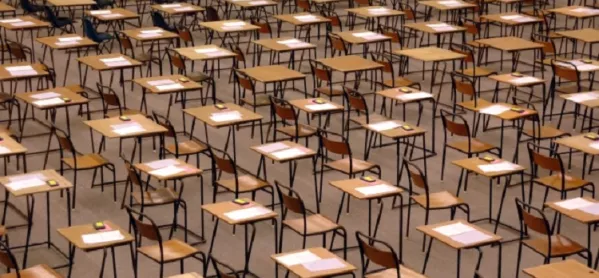- Home
- No room for manoeuvre on ‘essential’ national tests
No room for manoeuvre on ‘essential’ national tests

Education secretary John Swinney has given his strongest indication since he was appointed last month that he will not back down on controversial plans for standardised national assessment.
Mr Swinney was jeered when he defended the idea at a major teaching conference but later told TESS that he had no intention of rowing back on the “essential” plans.
Despite striking a conciliatory tone at the annual gathering of the EIS teaching union, he indicated afterwards that there would be little, if any, room for manoeuvre.
‘We don’t have to agree’
Mr Swinney said that, although local authorities already ran standardised tests, these could not be directly compared and used to drive up attainment nationally.
“That’s the purpose of standardised assessment - to enable us to do exactly that,” he added. “So there’s a discussion to be had with the teaching profession about that, but it’s clearly an essential part of the National Improvement Framework [NIF], and [I am] very focused on making sure that we implement standardised assessment.”
He insisted that he had a mandate to close the attainment gap even if the steps deemed necessary clashed with teachers’ views: “I simply have to point out that we won’t always agree on absolutely everything.”
Mr Swinney, who on Saturday became only the second education secretary to address the annual gathering of the EIS, received a generally polite reception; he even won some applause - for example, when he promised to help to “declutter” the primary curriculum.
But the atmosphere changed when he broached standardised national assessments for P1, P4, P7 and S3. The previous day, delegates had voted to boycott the tests if the system put forward was “unacceptable”.
There were gasps of shock and widespread muttering when Mr Swinney insisted that the tests would not increase teacher workload, as digital systems would deliver immediate results. The government later announced that it would tender for an online system using “the latest technology” to be in place for the school year 2017-18.
When Mr Swinney asked “Why do we need standardised assessment?”, many delegates beat him to answering his own question by crying out “We don’t!” in unison.
EIS general secretary Larry Flanagan said that he was generally “encouraged” by Mr Swinney’s continued “commitment to engaging with the teaching profession”.
Amid concerns over the potential for school league tables and teaching to the test, however, he gave this pointed advice to the education secretary: “Being a data-rich system is a good thing, but being a data-driven system is a bad thing.”
Scathing condemnation
Standardised assessment was one of the issues that dominated the conference, with speakers being scathing in their condemnation. In a passionate speech, former EIS president Helen Connor, a North Lanarkshire primary teacher, said that the profession should refuse to cooperate with the tests.
“This whole testing [plan] is a political headline-grabber - there is no educational basis to it whatsoever,” she added. “We should not be waiting to see if NIF works…we should be saying now we will not implement these assessments.”
Dumfries and Galloway teacher Andrew O’Halloran said that the tests would make it “very easy” for newspapers to construct crude school league tables using Freedom of Information legislation.
South Lanarkshire member Andy Harvey said that he was highly sceptical about a “Xanadu where kids will sit down at computers and these tests will mark themselves”.
Edinburgh buildings scandal: dead pigeons amid the debacle
Responding to an emergency motion at the EIS conference, members agreed to explore legal action against the Edinburgh Schools Partnership if the school buildings debacle in the city has not been resolved by August.
Thousands of pupils and hundreds of teachers were moved out owing to safety concerns, and many still haven’t returned to their premises. All are expected to return by the start of the new school year.
Delegates criticised the public-private funding models for the buildings, all of which were constructed around a decade ago, while teachers talked of the “drastic” impact of the closures. One delegate recounted discovering dead pigeons in cupboards on her return to school.
The Scottish government recently announced that there would be an independent inquiry into the scandal.
This is an article from the 24 June edition of TESS. This week’s TESS magazine is available in all good newsagents. To download the digital edition, Android users can click here and iOS users can click here
Want to keep up with the latest education news and opinion? Follow TES on Twitter and like TES on Facebook
Keep reading for just £1 per month
You've reached your limit of free articles this month. Subscribe for £1 per month for three months and get:
- Unlimited access to all Tes magazine content
- Exclusive subscriber-only stories
- Award-winning email newsletters



